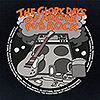For every Died Pretty, Celibate Rifles, Lime Spiders or Screaming Tribesmen show you endured a string of bands who were anything from tolerably lame to indescribably fucked. And that was in the smaller, seedier pubs.
When your band of choice climbed the ladder and graduated to more salubrious RSL clubs and beer barns - and many of them did when they were picked up by agencies and sucked onto the overground circuit - the headlining spots were filled by mainstream acts like The (not very) Rads, Moving Bowels, sorry, Pictures, and (shudder) Mondo Rock. Here are some home truths…
1. Nineteen-seventy-six was Ground Zero only in the minds of a couple of Oz punks and the horrible writers from the English print rags. Sure, a handful of trailblazers (Birdman, The Saints, Boys Next Door) kicked in the doors and played to a few hundred rabid and discerning fans in varying degrees of splendid isolation from each other and the rest of the world.
More importantly though, they (briefly) broke the industry stranglehold on making a record or putting on a show, and opened the gates for hundreds of others to jump on the elevator as the touring circuit came into existence. The cold, hard fact is that as much as we thought we belonged in tribes, the lines between cool/uncool, seminal/mainstream were much more blurred in Australia back then.
2. We Suburban Boys (and Girls) were as scathingly elitist and discriminating as the black-clad Carlton and Darlinghurst dilettantes that we laughed at on fleeting trips to the Trade Union Club but who had found the cool first stuff. The real musical snobs in the suburbs got their kicks from knowing all about X before “Dream Baby” was a seven-inch thing (yes, I liked their old stuff better) but couldn’t understand why nobody else didn’t hear the same thing.
3. Media mattered. Some listened to Triple M or 2SM while others tuned to Double Jay (truth be known, cassettes in cars were far preferable when the really boring or pretentious announcers were on shift) but there was also a lot of switching between. Mix tapes and party soundtracks provided the cross-pollination and photocopied zines were the real Interwebs back then.
Where’s all this leading? Glad you asked. This is the first of two collections of this stuff. The first came out in time for Xmas 2016. The other is about to land any tick of the clock. A surprising proportion of “The Glory Days” is listenable. Enjoyable, even. Its four CDs (91 songs) are sprinkled with dross but also some real gems. It’s actually very representative of the spread of what 1980s Oz Pub Rock was like. If you stepped foot on a sticky carpet in most parts of this wide, brown land then you’ll know, and maybe even like, much of what’s represented.
Screaming Tribesmen, Hitmen, Boys Next Door, Lime Spiders, Numbers, The Church, Sunnyboys and X mix it with “classic” pub rock fodder like the Oils, Richard Clapton, Men At Work and Swanee. People like Jo Jo Zep or Paul Kelly who started on the underground circuit and crossed over to overground are represented. So are silly aberrations like Jimmy and The Boys (little did you know they were once Ken West’s favourite band) and Uncanny X Men.
Older stagers like Thorpey, Stevie Wright, Russell Morris and Ted Mulry get a guernsey. And that Barnes bloke is here too, Sorry, he’ll never be listenable.
People talk about a distinctive Australian sound that was hard to define but undeniably present, especially when Aussie music started being exported to the Rest of the World. What made it different? Well, we were in there process of shaking off our cultural cringe. There’s a romantic (and not entirely invalid) notion that Our Music sounded harder and more energetic than Their Music because bands honed their craft in countless sweaty caverns full of drunken punters who demanded much and took no shit.
On a Thursday night in a typical suburban pub or club, 40 percent of the crowd would be chasing sex, a quarter would be mindlessly drunk and the balance would be paying attention to whoever was on the stage. In-between going to the bar.
We might justifiably look back with fondness on those times, but our collective attention spans were little better than today’s Generation Z, who we bag for having their eyes glued to small screens. Unlike us in pre-random breath testing days, most of them don’t have to put one hand over an eye to drive home. Remember how Sydney pubs used to put on comedians between bands to make sure we were taking notice?
“The Glory Days” is fun, bumpy and uneven but so was walking into a big live music venue back then. You paid your money and you often took your chances. Pub rock was omnipresent and insidious. Some of the commercial pap it spawned was undeniably earwig material. Be warned.


 2/3
2/3

 “What's he doing reviewing THAT?”
“What's he doing reviewing THAT?”